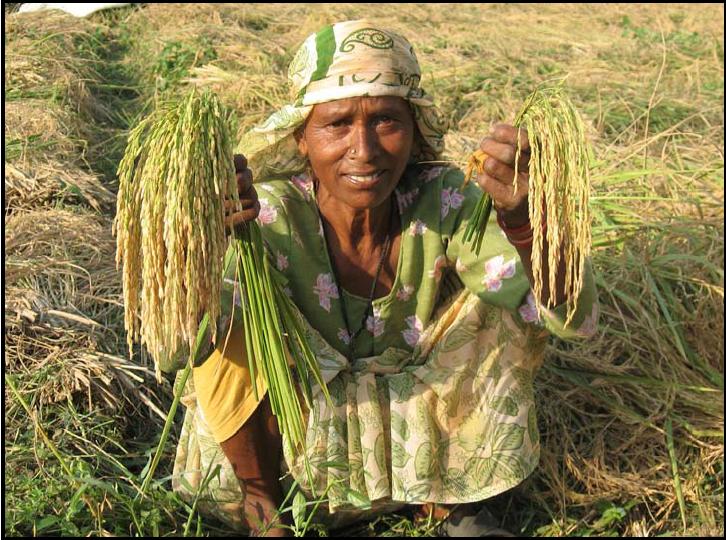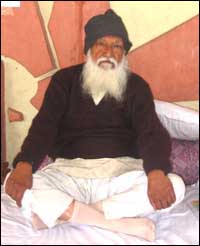People's Science Institute
Prof G.D. Agrawal resumes fast unto death to save the Ganga, Swami Avimukteshwaranand and others to join in support
Posted on 21 Jul, 2010 11:10 AMForwarded to the Portal by: Ayan Biswas
Image and News Courtesy:
Shankracharya designate Swami Avimukteshwaranand ji presided over an emergency meeting organized by Manushi Sangathan, Ganga Ahvaan and Ganga Yamuna Jal Biradri to express our strong protest against the patently illegal decision of the Group of Ministers giving clearance to the Loharinag-Pala dam on the Ganga River. The following expert members of the NGRBA also participated in the meeting to express their strong protest having been kept in the dark about the appointment of the GoM which has passed a virtual death sentence on the most sacred river of India: Rashid Hyatt Siddiqui, Rajendra Singh, Rama Raota and Ravi Chopra.
Sisyphean labours - Domestic water supply in the central-western Himalayas
Posted on 11 Sep, 2009 01:11 PMThis paper by the People's Science Institute informs that domestic water supply, mistakenly referred to as drinking water supply, is a state subject under the Indian constitution. However, policies and programmes are ususally set within a national framework as a part of the national five year plans. Domestic water supply programme performance in Himachal Pradesh and Uttarakhand have followed national trends.
Experience sharing workshops on System of Rice Intensification (SRI) - A report
Posted on 29 Aug, 2009 02:55 PM This report available on the Watershed Support Services And Activities Network (WASSAN) site provides the details of three workshops organised by People's Science Institute (PSI) in October 2006 in the states of Uttarakhand and Himachal Pradesh as a first step towards sharing the experiences of System of Rice Intensification (SRI) method with the stakeholders group as well as assist the voluntary organisations in Uttarakhand and Himachal Pradesh to develop professional capabilities in the field of SRI method of paddy cultivation.
This report available on the Watershed Support Services And Activities Network (WASSAN) site provides the details of three workshops organised by People's Science Institute (PSI) in October 2006 in the states of Uttarakhand and Himachal Pradesh as a first step towards sharing the experiences of System of Rice Intensification (SRI) method with the stakeholders group as well as assist the voluntary organisations in Uttarakhand and Himachal Pradesh to develop professional capabilities in the field of SRI method of paddy cultivation.
Groundwater contamination near the Union Carbide plant at Bhopal: a draft research report
Posted on 13 Aug, 2009 02:54 PMThis draft research report by the People’s Science Institute (PSI), Dehradun deals with groundwater contamination near the Union Carbide plant at Bhopal. The main objective of PSI's monitoring exercise was to assess the degree of groundwater contamination, if any, in the vicinity of the erstwhile UCIL plant particularly in the context of the huge quantum of the ill-contained toxic wastes lying unheeded inside.
Water management traditions in the central-western Himalayas : a study by People's Science Institute
Posted on 22 May, 2009 03:53 PMThe report highlights how traditionally, local communities exercised rights of ownership, use and management over their natural resources in the Himalayan states. They devised a variety of management systems suited to their own specific situation. Sanskar (precepts and rites), sanskriti (culture and customary practices) and niti (state policy and administration) were the bases of water harvesting traditions and their longevity. Individual dharma and social customs were the necessary conditions for sustaining these traditions, while local autonomy in resource management was the critical sufficient condition.
Protesting broken promises: Dr. G.D. Agrawal resumes fast-unto-death
Posted on 20 Jan, 2009 12:19 PM
Images of a dying river, handwritten Press releases & more: Images of a Struggle on Flickr Charging the Government of India with not keeping its solemn commitment to keep the River Bhagirathi alive in its pristine stretch from Gangotri to Uttarkashi, Dr. G.D. Agrawal has resumed his fast-unto-death from Makar Sankranti Day, Wednesday, Jan 14, 2009.
You may recall that Prof. G. D Agrawal, former Professor & Dean of Students at IIT-Kanpur, the first Member-Secretary of India's Central PollutionControl Board and one of India's foremost environmental scientists went on a fast from June 13, 2008 to seek uninterrupted flow of River Bhagirathi (Ganga) in its natural form between Gangotri and Uttarkashi. His demand was very limited & specific, i.e., that the River Ganga be allowed to flow in its natural form in this 125 km stretch from its origin. This is the only stretch left now where the Ganga can still be seen in its pristine form. Dr. Agrawal requested the Govt. of India & the State Govt. of Uttarakhand to stop construction of Hydro Electric Projects (HEPs) in this stretch so that river flow was not diverted through tunnels that would destroy its ecology and its unique self-purifying properties. (diagrams are provided in the attached press release). Indians across the world got sensitized and lent their support to Prof Agrawal. Many wrote or met the PM of India and the CM of Uttarakhand and requested them to protect the Holy Ganga , whom Pandit Jawaharlal Nehru described as India's civilizational identity.
High Level Expert Group on the Bhagirathi river lacks required expertise
Posted on 28 Aug, 2008 10:05 PMAll is not well with the High Level Expert Group (HLEG) constituted on an order of the Government of India to determine the flow required to keep the Bhagirathi river 'alive and to ensure perennial environmental flow in the river'. It may be recalled that on June 30, 2008 the Government of India committed itself to "suitably ensure perennial environmental flow in all stretches of river Bhagirathi."This commitment was made in response to a representation of the Alumini Association of IIT- Kanpur to the Prime Minister of India requesting his intervention in the fast-unto-death undertaken by Dr. G.D. Agrawal , a former Dean of IIT-Kanpur -- to ensure the natural and uninterrupted flow of the Bhagirathi river between Gangotri and Dharasu (Uttarkashi). Subsequently the Ministry of Power, GoI, directed Shri R.S. Sharma, Chairman & Managing Director of NTPC, to constitute a high level expert group. The biggest problem with the HLEG is that it lacks the necessary scientific expertise to comprehensively address the issue. In a letter to Shri R.S. Sharma, rejecting his invitation to be a member of the HLEG, Dr G.D. Agrawal wrote, "Several members of the HLEG as constituted (including its Chairman) fall extremely short on any sort of expertise on river ecology and environmental flows...The commitment of most proposed members towards conservation of Bhagirathi Gangaji as the mother of India's faith, unity and culture is also questionable and I cannot afford to provide credibility to its deliberations and conclusions by being an ordinary member of the group."
Invitation for joining URAN PSI group
Posted on 18 May, 2008 10:48 PMSeveral threats have emerged in recent years to the pristine Himalayan rivers of Uttarakhand. These include: (i) the proposed construction of 220 dams (ii) the drying up of rain fed rivers due to deforestation and deforestation of their catchments (iii) release of untreated sewage from river side towns and habitations and (iv) illegal sand mining of river beds.
Prof.G. D. Agrawal's satyagraha against the construction of dams on the Bhagirathi River
Posted on 17 May, 2008 09:08 AM
Pained by the unrelenting destruction of the Ganga river, especially by a series of dams in its upper reaches, Dr G.D. Agrawal, India's pre-eminent environmental quality scientist and a legendary Professor (and HoD) of Civil & Environmental Engineering at IIT-Kanpur. (Access:Biography Sketch Here) has decided to go on a fast-unto-death to oppose its continuing desecration. His conviction that we are staring at an unprecedented ecological and cultural catastrophe comes from his powerfully logical mind. Critique on proposed dams on Bhagirathi River. Access here: Critique on Dams